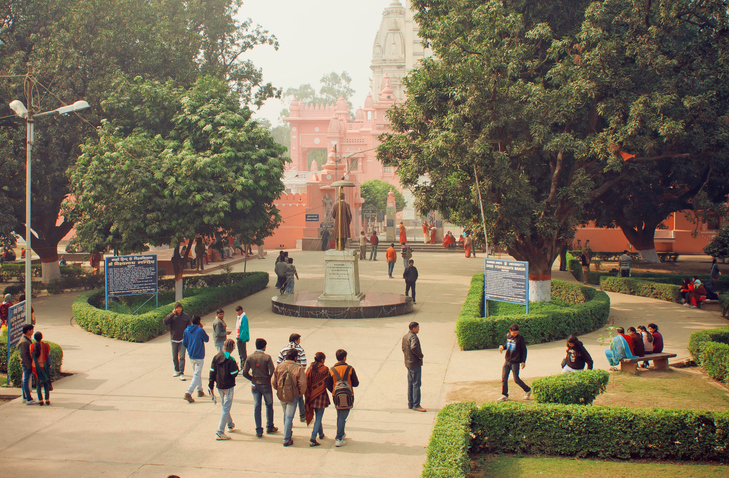Applying to university in India: everything you need to know
For international students, applying to university in India can be overwhelming. This comprehensive guide breaks down the elements involved

You may also like
Why India?
India has become a hub for higher education, attracting non-resident Indian (NRI) and international students with its top-tier universities and affordable education.
For an international or NRI student aspiring to study in India, the application process can seem overwhelming. This guide provides a detailed breakdown of the steps involved, as well as visa guidance and an outline of funding opportunities.
India offers a wide range of programmes across disciplines such as engineering, medicine, humanities, business and the sciences. Some of the most popular universities for NRI and international students include:
- Indian Institutes of Technology (IITs)
- Indian Institutes of Management (IIMs)
- National Institutes of Technology (NITs)
- University of Delhi
- Jawaharlal Nehru University (JNU)
Most universities in India accept NRI and international students through special quotas, such as the Direct Admission of Students Abroad scheme or Indian Council for Cultural Relations scholarship programme.
Eligibility criteria
Eligibility criteria may vary depending on the programme and university. However, some common requirements are:
1. Academic qualifications
International and NRI students must have completed 12 years of schooling (or equivalent to India’s Class 12). For postgraduate programmes, a relevant undergraduate degree is required.
2. Standardised tests
Some programmes may require scores from standardised tests, such as SAT.
3. English proficiency
For students from non-English-speaking countries, proof of proficiency in English (TOEFL or IELTS) may be required, unless the medium of instruction in their previous education was English.
Application process
Here’s a step-by-step guide to the application process.
1. University-specific application forms
Register online: visit the university website and register as an international applicant. Students will need to create an account with their email address and personal details.
Application form: fill out the application form carefully. Ensure that all sections are completed, including personal information, academic qualifications and preferences for courses or programmes. Upload scanned copies of relevant documents, including:
- Passport
- Academic transcripts
- Standardised test scores
- Proof of English proficiency (if required)
- Statement of purpose and letters of recommendation
Application fee: pay the application fee online using credit card, debit card or bank transfer. The fee varies by university, but typically ranges from 2,000 rupees (approximately £20) to 10,000 rupees (approximately £100).
2. Dasa scheme
For NRI and international students applying to premier technical institutes, such as IITs or NITs, the Dasa scheme is a popular route. The steps are:
Eligibility: NRI students must have completed their 10+2 outside India, in subjects including physics, chemistry and mathematics, or similar.
SAT subject-test scores: students applying through Dasa must submit SAT subject-test scores (for engineering courses) or GRE/GMAT scores (for other programmes).
Merit-based admission: admission is on merit, and students are ranked based on their SAT scores.
3. External exams for engineering and medical programmes
NRI and international students may not always need to take the Joint Entrance Examination or National Eligibility cum Entrance Test for admission to Indian universities – it depends on the course and admission route they choose.
a. Engineering programmes (BTech or BE)
Joint Entrance Examination (JEE): while the JEE is mandatory for domestic students seeking admission to premier engineering institutes (IITs, NITs and other central institutions), NRI and international students generally have alternative options, such as the Dasa scheme.
Dasa scheme: under this scheme, NRI and international students are not required to take JEE but must submit SAT subject test scores in mathematics level 2, physics, and chemistry, for admission to programmes at NITs, Indian Institutes of Information Technology (IIITs) and other technical institutes.
IITs: for admission to IITs (with two Is, rather than three), even NRI and international students must take the JEE advanced exam. The Dasa scheme does not apply to IITs, and JEE advanced is mandatory.
Thus: for NITs, IIITs, and other technical institutes, apply via Dasa, using SAT subject-test scores. But for IITs, JEE advanced is required, even for NRI and international students.
b. Medical programmes (MBBS or BDS)
National Eligibility cum Entrance Test (NEET): NEET is required for admission to MBBS, BDS and other medical courses in India for international and NRI students, as well as domestic students.
NEET is a single national-level entrance test for medical programmes, and NRI and international students must also sit for it if they are applying for a medical place in Indian medical colleges.
Some colleges may have a quota for NRI students, but NEET remains mandatory for admission under any quota (general or NRI).
c. Exceptions and private universities
Some private universities may have their own entrance exams or accept SAT or other standardised-test scores for admission to engineering programmes. However, for medicine, NEET is compulsory even for private colleges.
Application deadlines
The application deadlines for Indian universities vary depending on the type of institution and the admission route (general university admission, Dasa scheme, Indian Council for Cultural Relations scholarships, and so on). Below is an overview of the typical deadlines for various admission routes for NRI and international students.
1. General university admissions
Most Indian universities have multiple rounds of admissions, with specific deadlines based on the academic calendar. The key intake periods are:
Undergraduate programmes (general admission):
-
- Application start date: December to February
- Application deadline: April to June
- Admission results: June to July
- Classes begin: July to August
Postgraduate programmes:
-
- Application start date: January to March
- Application deadline: April to June
- Admission results: July to August
- Classes begin: August to September
It is important to check the specific university website for exact dates, as they may vary.
2. Direct Admission of Students Abroad (Dasa) scheme
For NRI and international students applying to technical institutes, such as IITs, NITs, and IIITs, through the Dasa scheme, the timeline is different. The deadlines typically follow this schedule:
- Application start date: March
- Application deadline: May
- Merit-list announcement: June
- Seat-allocation rounds: July
- Classes begin: August
Note: SAT subject-test scores must be submitted along with Dasa application. Make sure to register for and complete the SAT subject tests in advance of the application deadline.
3. Indian Council for Cultural Relations (ICCR) scholarships
For international students applying under the ICCR scholarship programme, the deadlines are as follows:
- Application start date: January
- Application deadline: April
- Selection results: May to June
- Classes begin: July to August
ICCR scholarships cover a range of undergraduate and postgraduate programmes, and applicants must ensure that they adhere to the specific timelines of the ICCR.
4. Private universities
Private universities in India, such as Ashoka University, O.P. Jindal Global University, Manipal University and Amity University, often have their own application timelines, which might differ from those at public universities. The deadlines for these institutions are usually:
- Early-admission round: November to January
- Regular-admission round: January to April
- Late-admission round: May to June (depending on seat availability)
5. State universities
State universities typically align with the national academic calendar. Applications usually open around March or April, with deadlines in May or June. For postgraduate programmes, deadlines can extend to July.
6. Important tips
- Always double-check university-specific deadlines, as they can change each year.
- Apply early to avoid missing deadlines, especially for competitive programmes or those requiring standardised-test scores.
- Students applying through scholarships or the Dasa scheme should ensure that they complete the standardised tests well before the deadline.
Visa guidance
Once a student receives an admission offer, confirmed by letter, the next crucial step is applying for a student visa. The following is a breakdown of the visa-application process.
Student visa (category S)
International students need to apply for a student visa (category S). This can be done online through the Indian embassy in their country of residence. If NRI students hold foreign citizenship, then they will also need a student visa; those holding an Indian passport will not.
Documents required
- Admission letter from an Indian university
- Passport valid for at least six months
- Passport-sized photographs
- Proof of adequate financial support
- Completed visa-application form
Visa deadlines
International students should apply for a student visa at least two months before the intended travel date, to allow time for processing.
Visa duration
Student visas are typically granted for the duration of the academic programme. It is important to renew the visa as per the university’s rules.
FRRO registration
International students staying in India for more than 180 days need to register with the Foreigners Regional Registration Office (FRRO) within 14 days of arrival. The FRRO will issue a residence permit, which must be renewed regularly.
Funding opportunities and scholarships
There are numerous funding options and scholarships available to NRI and international students studying in India.
ICCR scholarships: the Indian Council for Cultural Relations offers scholarships to international students from more than 150 countries. These scholarships cover tuition fees, living expenses and travel.
Dasa scheme: while Dasa is a merit-based admission route, many participating universities offer financial aid based on academic performance.
University scholarships: many Indian universities provide scholarships specifically for NRI and international students. Check the universities’ own websites for details.
Education loans: some Indian banks offer education loans to NRI students, though international students may need a co-signer who is an Indian citizen.
External scholarships: organisations, such as the Tata Trusts and JN Tata Endowment, offer scholarships and grants to students pursuing higher education in India.
Post-admission steps
After securing admission and a visa, students should look into the following:
Accommodation: most universities offer on-campus housing for international students. It is advisable to apply early, as spaces are limited.
Medical insurance: students should ensure that they have valid medical insurance for their stay in India. Some universities require proof of insurance at the time of enrolment.
Cultural adjustment: students should be prepared for cultural differences. They can make use of international-student support services provided by the university to help with the transition.
